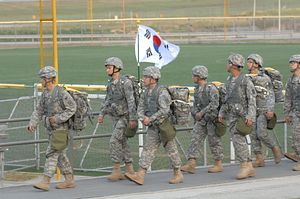In May 2017, under the auspices of a little-used piece of legislation from the 1960s, South Korean authorities launched a wide-ranging investigation into the conduct of members of the country’s armed forces. Unusually aggressive tactics were used, including illegal searches and forced confessions, according to a South Korean NGO, the Military Human Rights Center of Korea. Twenty-three soldiers were eventually charged.
While the use of such tactics is indefensible in any investigation, you’d be forgiven for guessing that the case might have related to the sort of high crimes traditionally associated with the military, such as treason or desertion. You’d be wrong. The soldiers had in fact been charged for violating Article 92-6 of the South Korean Military Criminal Act, a law prohibiting sex between men.
There is no law criminalizing same-sex sexual activity between civilians in South Korea, but Article 92-6 of the Military Criminal Act punishes consensual sexual activity between men – whether on or off duty – with up to two years in prison. Although on the statute books since 1962, the law had seldom been enforced, making 2017’s aggressive investigation all the more surprising.
Amnesty International interviewed one of the soldiers who was part of the investigation in 2017, and he described being asked about contacts on his phone. He eventually identified another man as his ex-lover and then the investigators barraged him with outrageous questions, including asking what sex positions he used and where he ejaculated.
The effects of the investigation still linger. “The authorities came to me like peeping Toms. I have lost faith and trust in people,” he told us.
Last week, Amnesty International released the report Serving in silence: LGBTI people in South Korea’s military. Based on interviews with LGBTI personnel, the report reveals the destructive impact that the criminalization of consensual same-sex activity is having not only on members of the military, but on wider Korean society.
In a series of alarming accounts, soldiers explained to us how Article 92-6 is enabling discrimination, intimidation, violence, isolation, and impunity in the South Korean military. One soldier who served about a decade ago told a horrifying story of seeing a fellow soldier being sexually abused. When he tried to help, his superior officer forced him to have oral and anal sex with the abused soldier. “My superior officer said: ‘If you make a report, I will beat you until you will not be able to recover,’” the soldier told Amnesty International.
Many of these offenses are being carried out by senior officers, protected by military power structures that deter victims from reporting incidents and foster a culture of impunity.
The discrimination is so pervasive that soldiers risk being targeted not only based on their actual sexual orientation and gender identity, but even for not conforming to perceived gender stereotypes or for walking in an “effeminate” manner, having fairer skin, or speaking in a higher-pitched voice. Many men interviewed for the report hid their sexual orientation while performing their mandatory military service.
Even when it is not actively being implemented, Article 92-6 helps to construct societal attitudes. It sends the clear message that people who identify as gay, bisexual, or transgender – or anyone who engages in any form of same-sex consensual sexual activity or whose self-defined gender identity or gender expression differs from acceptable “norms” of gender and sexuality – can be treated differently.
The legislation is just the sharp end of the widespread discrimination that LGBTI people in South Korea face. Many hide their sexual orientation and/or gender identity from their families and their rights are not recognized or protected in law.
The South Korean Constitutional Court has ruled Article 92-6 to be constitutional in 2002, 2011, and 2016, even though other jurisdictions and the United Nations have found that laws criminalizing consensual same-sex sexual activity violate human rights. The Constitutional Court ruling in 2016 noted that, even if the clause led to discrimination, the restriction was imposed to preserve combat power of the army. However, other countries have removed such provisions from military codes without any negative impact on military preparedness. South Korea’s Constitutional Court is currently considering yet again whether the criminalization of consensual same-sex sexual activity by military personnel is unconstitutional.
By criminalizing sex between men in the Military Criminal Act, the South Korean government is failing to uphold human rights, including the rights to privacy, to freedom of expression, and to equality and nondiscrimination. It is also in direct contravention of Article 11 of the South Korean constitution, which states that “all citizens are equal before the law.”
The military code does more than legislate against particular sexual acts; it also institutionalizes discrimination and risks inciting or justifying violence against LGBTI people inside the military and beyond.
South Korea’s military must stop treating LGBTI people as the enemy. No one should face such discrimination and abuse because of who they are or who they love. South Korea must urgently repeal Article 92-6 of the military code as a crucial first step toward ending the pervasive stigmatization LGBTI people are facing.
Roseann Rife is East Asia Research Director at Amnesty International.
































